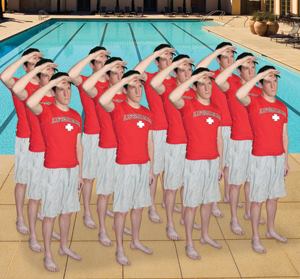As operators prepare to open for a new season, many are wondering: Are my lifeguards fully prepared to handle the responsibility of life-and-death decision-making? To answer this question, you must use a combination of tests and challenges.
Tests start with updating guard certifications. More than simply verifying certs, these tests include performance evaluations as well as written exams. Testing then continues all season long with “Red Ball Drills,” and external and internal audits.
Red Ball Drills are real-life problems, such as a heart attack during operating hours. Some operators do these drills before opening, but that misses the point. This drill is about practicing a real-life problem with a live crowd environment.
In the military, they do everything possible to simulate combat conditions, including live fire drills. We have the same responsibility to train and simulate real emergencies, so our guards are prepared to handle them.
In these drills, lifeguards are tested for their ability to work as a team. For an aquatics facility with a slide, we include the guard at the top of the slide. After each patron enters the slide, the guard has time and opportunity to scan the entire area with a valuable bird’s eye view of the bottom of the pool.
Currently, at our facilities, fire department EMTs and paramedics are hired to administer this test to our staff on a crowded day in a spot check manner. I don’t even know when they’re coming. When they arrive, they pick on the guard who looks to be the weakest link. A firefighter walks up to that guard and says, “I’m from the Fire Department. This is a Red Ball Drill, and this is the scenario.”
Lifeguards have to clear the pool and respond to the emergency. Afterward, the fire department writes up a report, which gives us a totally independent audit.
To accommodate these drills, we have a sign posted at each of our facilities informing our patrons that this may happen. We make sure we activate the drill right before break time to minimize the inconvenience to our patrons. I hear from many operators that they’re afraid of doing these kinds of drills because it will annoy patrons. But we get a lot of compliments from our patrons. They appreciate witnessing all the skill levels and emergency equipment in action.
External audits are “secret shoppers,” who observe and test lifeguards’ scanning and vigilance while on duty. Again we hire someone to do this drill, preferably a lifeguard instructor. It’s important for them to only take mental notes so the guards don’t know they’re being audited.
Afterward, the individuals announce they are secret shoppers, then tests guards on other skills. We bring in extra guards that day so these tests can occur.
Internal audits are performed by the management team, which concentrates on lifeguards’ scanning abilities and behaviors. This is very similar to the secret shopper, except the guards know they are being audited.
Both audits check that guards are changing positions — that is, sitting to standing — at least once every five minutes, as recommended by the Five-Minute Scanning Strategy from Tom Griffiths, aquatics director and safety officer for athletics at Penn State University.
Additionally, in the summer our lifeguards are given news articles on recent drownings and then tested on what they read, along with some questions about specific areas of weakness that the audits uncovered. This is done three or four times per season. Ultimately, the purpose of the quizzing is to build awareness that drowning accidents really do happen and what could have been done to prevent them.
Lifeguards get a reward for a job well-done. For instance, those earning a 90 percent or higher on these quizzes and audits get a “Guard” baseball hat.
Of course, do not neglect your substitute guards. They can be your weakest link. Make sure they receive the same training and testing as the rest of your staff.
So, next time you get upset at your guards for not doing enough, ask yourself, “Do they really understand all that is required of them?” Think about whether they’re being given all the training and skills needed, and if you’re demanding enough of them.
By challenging yourself to train your lifeguards in this manner, they may well develop the eyes of a professional lifeguard who scans and understands. At this point, you’ll be able to say, “They’re ready!”


